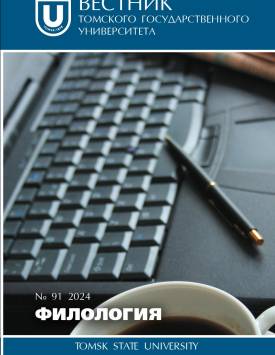The plot of the journey in Andrei Bitov’s story Birds, or The Catechesis of Man (1971, 1975). Article Two. Finding a way out of the epistemological crisis: Ecology, ethology, eschatology
This article is the last of two publications devoted to the poetics of Andrei Bitov’s travel story Birds, or The Catechesis of Man (1971, 1975) - the first part of the tetralogy novel The Catechumens (1970-2018). The aim of the article is to analyze ecological, ethological, and eschatological scenarios for overcoming the epistemological crisis a modern person experiences that are presented in the story. The main research methods employed were semiotic, narratological, intertextual, and cultural. The differentiation of the ways of the author’s presence (the profane hero, the reflective narrator, and the omniscient writer-creator) is considered as a method of depicting the evolution of lyrical consciousness. In the methods chosen by Bitov to determine the position of a person in being, the perception of Nikolay Zabolotsky’s ideas is found. It turns out that the condition for the subject’s ontological orientationis his involvement in a large Dialogue with the world. The Dialogue indicates the expansion of the epistemological horizon, the advent of the era of communicative rationality. The resulting chord of the journey is interpreted as an experience of connecting the cyclic ethological (the awakening of a primitive, animal thirst for life in a post-industrial man) and linear Christian (the final kenotic self-belittling of the hero as a “servant of God”, praying to Him for mercy) pictures of the world to represent the consciousness of the modern person - liberating, learning to trust the being. It is concluded that, according to Bitov, the main achievement of the hero-wanderer is the comprehension, acceptance of the sovereign nature of the Other, and the ability of people to learn from the being is determined by the living Logos, which is present in the ontology and orients them in the world. It is shown that ecology inscribes man into the landscape, ethology into the continuity of the living organic world, and eschatology into the paradigm of symmetrical existence, which has a beginning and an end. In the post-anthropocentric context of the story, the true difference between a person and an animal is the ability to elevate an empirical fact to an existential metaphor, to experience an event of external reality as co-existence. As a result, a compromise is achievable between the anthropic principle, according to which the cosmogonic program of the Universe from the very beginning assumed the appearance of a human contemplator in the world, and a post-anthropocentric view of man as part of a system - biological, existential, ontological. The author declares no conflicts of interests.
Keywords
Andrei Bitov, Birds, or The Catechesis of Man, epistemological crisis, ecology, ethology, eschatologyAuthors
| Name | Organization | |
| Buhanova Ekaterina D. | Tomsk State University; Siberian State Medical University | Ekaterinabuhh@mail.ru |
References

The plot of the journey in Andrei Bitov’s story Birds, or The Catechesis of Man (1971, 1975). Article Two. Finding a way out of the epistemological crisis: Ecology, ethology, eschatology | Vestnik Tomskogo gosudarstvennogo universiteta. Filologiya – Tomsk State University Journal of Philology. 2024. № 91. DOI: 10.17223/19986645/91/9
